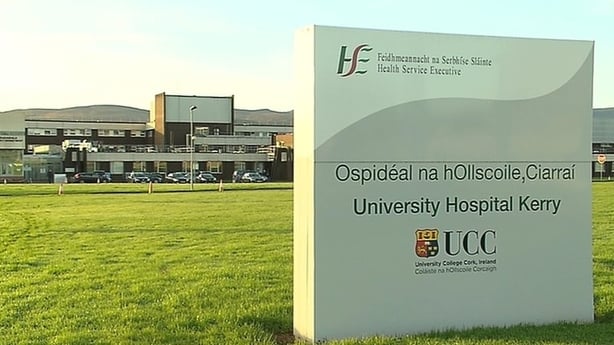The Health Service Executive has apologised to the family of a 35-year-old woman who died after giving birth at University Hospital Kerry (UHK) in Tralee.
The apology was issued at the opening of the resumed inquest into the death of Zimbabwe-born Tatenda Mukwata, by senior counsel John Lucey.
The mother of three lived in a direct provision centre in Kenmare, Co Kerry.
She died hours after giving birth to her fourth daughter, Eva, by Caesarean section.
A pathologist told the opening day of the inquest in August that Ms Mukwata had died of haemorrhage and shock.
Today, Mr Lucey read an apology signed by General Manager Mary Fitzgerald on behalf of UHK "for the failings of care afforded to Tatenda at this hospital on 20th and 21st April 2022".
"We fully accept that these failings should not have happened, and that earlier intervention would probably have prevented Tatenda's death.
"An external review of the matter is nearing completion and as a hospital we will endeavour to ensure lessons are learned.
"We are deeply sorry that you have suffered the tragic loss of Tatenda. We wish to apologise to you unreservedly and offer our heartfelt condolences.
"We acknowledge the grief, stress, trauma, and suffering that you and your family continue to endure as a result of Tatenda’s death for which we are truly sorry."
In response, Dr Jonn O’Mahony, senior counsel for the Mukwata family, said the apology was acknowledged as appropriate.
"Albeit it comes very late in the day for the family," he said referring to the fact that the apology issued to the family on 22 September came 17 months later.
"It is our belief that matters were entirely clear from the time of the post mortem that she had bled to death in Kerry University Hospital," Dr O’Mahony said.
"This was a death that ought never have happened," he added.
Evidence given by Tatenda's daughter and mother
Ms Mukwata's eldest daughter, 18-year-old Rutenda Mukwata, told the inquest how on the night of 20 April 2022, at Atlantic Lodge Direct Provision Centre in Kenmare, her mother had called the ambulance service at around midnight.
The previous day, she said, she had met her mother off the bus after she returned for a pre-planned medical appointment at UHK.
Her mother was feeling tired and dizzy and felt she might have been kept in.
At around midnight, she woke to hear her mother talking to paramedics, who also spoke to Rutenda.
Her mother said she thought that she was having contractions and had a blood clot.
"She knew this as she was studying to become a nurse,’ Ms Mukwata’s daughter said.
The paramedics thought that she had gone into labour. An ambulance arrived to bring her mother to hospital and Tatenda waved goodbye.
"That was the last time I saw her in person," the 18-year-old said.
They texted each other and her mother told her she was going for a Caesarean section.
At 1am, on 21 April, the hospital contacted Rutenda and asked her to come in.
"I said I had no way to get to the hospital and they sent a police car to come and get me," Rutenda said.
"I still didn’t know anything was wrong and I was excited to see mom and the baby."
However, when she got to the hospital, she was told that her mother "didn’t make it" and she was taken to see her and the baby.
Answering a question from her counsel, Dr O’Mahony, Rutenda said her mother looked fine and was still warm.
"I just hoped she would wake up," she said.
She kissed her mother, Rutenda added, and was brought back to Kenmare at around 10 or 11am.
She said that she was in shock and devastated, and did not know what to do or how she could tell her sisters.
She phoned her grandmother Catherine and they agreed that she would come [from London] and they would tell her younger sisters together.
The foreman of the jury put it to Rutenda that she had mentioned a clot and asked if her mother had passed blood?
Her daughter said that she had and it was a blood clot.
Tatenda’s mother, Catherine, said that at the beginning of the pregnancy her daughter was attending Cork University Hospital (CUH) but because public transport was limited, it was decided to transfer her care to UHK.

Tatenda had been HIV positive since 2009 and attended a HIV specialist in CUH.
She did not want to be transferred to UHK because she was HIV positive, her mother said.
When she was moved to the Tralee hospital, Tatenda told her mother how she overheard staff saying they had never dealt with her condition and also giving birth with HIV.
"Tatenda was uneasy about this. She said to me how can I feel confident with this," Catherine added, and said this was around February of 2022.
However, when Tatenda was told that a team was assembled by UHK to deal with this she felt more relieved.
On her first visit to the hospital she overheard two staff nurses looking at her file and saying "this one is for an operation".
Questioned by HSE Senior Counsel John Lucey, Catherine Mukwata said she was relieved to hear a team had been assembled who could deal with her HIV and be present when she was giving birth.
However, the team was not present when she gave birth, Tatenda's mother added.
Paul Hughes, then consultant obstetrician and gynecologist at UHK, said that the patient had three previous uneventful pregnancies but the babies’ weights were unknown.
She also had an ectopic pregnancy in 2016.
There was a recent history of hypertension since March 2021 and this was treated, he said.
Tatenda was under the care of the infectious disease team at CUH, he said, adding that the team was happy with her and there was regular follow up.

But in March 2022, her haemoglobin had dropped and she needed iron.
A drop in hemoglobin could be significant in pregnancy, he said, but it was picked up and treated. Intravenous iron injections were not necessary.
The concern in pregnancy was to get the haemoglobin levels up as after giving birth it would drop again with blood loss, he outlined.
Mr Hughes said her scans were normal and there was good foetal growth.
Responding to Mr Lucey, the retired consultant said that GPs would refer patients who were HIV positive to UHK and it would liaise with the Infectious Disease Clinic in Cork.
The clinic and the Tralee hospital would sometimes take over the care of the patient if there were concerns, he added.
Mr Hughes said that Tatenda was keen to go into spontaneous labour, as she had done so in her previous pregnancies.
He said that he met the deceased’s mother and daughter some days after her death.
He offered them an unreserved apology and said there would be an external and internal review.
The external review, which was to have been published in January, has still not been published, the inquest heard.
Outside the hearing today, the solicitor representing the family said the HSE apology was "not an explanation" for the death.
"It doesn't explain how Tatenda Mukwata bled to death in University Hospital Kerry," Conor Murphy said.

